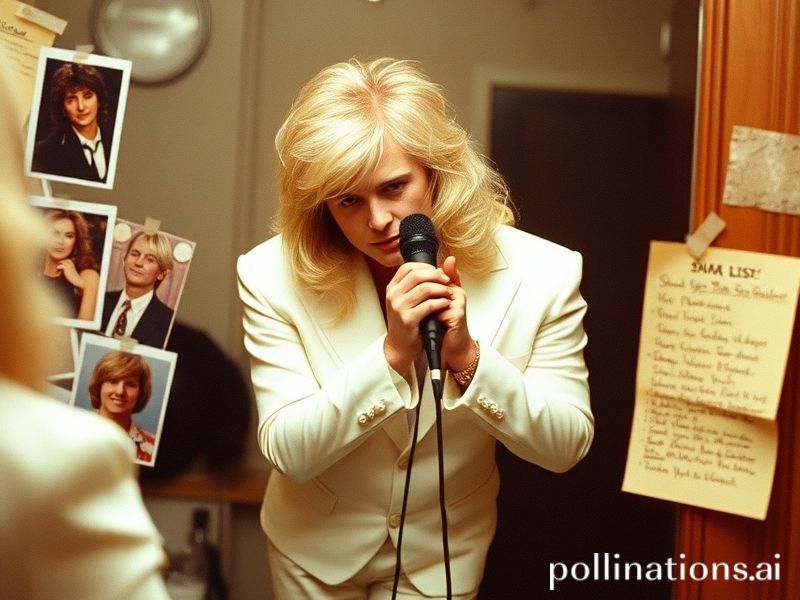How Shaun Cassidy Accidentally Became the Planet’s Nostalgia Arms Dealer
The Last Cassidy Standing: How a 1970s Teen Idol Quietly Became the Global Metaphor We Deserve
By *Dave’s Locker International Desk*
Somewhere between Tehran’s uranium centrifuges and the latest TikTok dance craze, Shaun Cassidy—yes, that Shaun Cassidy—has improbably become a geopolitical Rorschach test. While diplomats argue over whose missiles can reach whose suburbs, the former feather-haired heart-throb has spent the pandemic years quietly selling television formats from Reykjavík to Rabat, proving that soft power can still wear bell-bottoms in the age of hypersonic glide vehicles.
Let’s set the scene: 1977, Cassidy’s poster outsells Mao’s Little Red Book in Manila flea markets. Fast-forward to 2024, and the same face—now mercifully free of satin baseball jackets—hovers over Zoom calls with Netflix executives deciding whether Romania needs a gritty reboot of *The Hardy Boys*. The joke, of course, is that no one in Bucharest asked for this, yet here we are, exporting American nostalgia like it’s artisanal fentanyl.
The international angle is deliciously absurd. In South Korea, Cassidy’s production company just wrapped a K-drama where a North Korean defector solves crimes using only 1970s AM-radio trivia. Ratings were so high that Seoul briefly considered weaponizing the soundtrack across the DMZ loudspeakers, until cooler heads remembered that Pyongyang already has its own boy-band-hostage program. Meanwhile, German state broadcaster ZDF green-lit *Der Shaun*, a dark comedy in which an aging pop star coaches Syrian refugees on how to infiltrate European pop charts. (Financing came from the EU’s “Cultural Hegemony Reinvestment Fund,” a line item so shamelessly Orwellian it could only exist in Brussels.)
Why does any of this matter? Because Cassidy’s second act illuminates a universal truth: the world is so starved for innocence it will binge-watch reruns of innocence we never truly possessed. In Lagos, bootleg *Hardy Boys* VHS tapes are traded like crypto; in São Paulo, street vendors sell counterfeit Cassidy tour shirts to kids who think he’s a new Spotify algorithm. The phantom limb of pre-digital adolescence has become a transnational commodity, and Shaun—bless his surgically unlined 65-year-old face—is its accidental brand ambassador.
There is, naturally, a darker punchline. While Cassidy pitches feel-good mysteries, the planet he’s monetizing is busy stockpiling iodine tablets. Japan just released a Godzilla-themed PSA on nuclear preparedness featuring a chibi Cassidy cameo; sales of potassium iodide spiked 400%. Somewhere in a think-tank sub-basement, a junior analyst is drafting a white paper titled “Leveraging Retro Nostalgia for Civil Defense Engagement.” The analyst’s name is probably Kevin. Kevin has never felt the touch of another human, but he knows the exact Nielsen rating for *The Partridge Family* in the former Yugoslavia.
Yet the man himself remains maddeningly serene. When asked by *Le Monde* whether he feels complicit in the weaponization of nostalgia, Cassidy shrugged: “I just wanted to write stories where the biggest explosion is a bass solo.” It’s the kind of answer that makes you want to hug him and then immediately check your credit score.
So what does it mean that in 2024, the most effective cultural diplomat is a guy whose biggest hit was about breaking into song on a school bus? It means we’ve run out of futures and are leasing the past at compound interest. It means the Cold War has been replaced by the Luke-Warm War, fought with key changes instead of key strikes. And it means that somewhere, right now, a Ukrainian drone pilot is humming “Da Doo Ron Ron” while guiding a kamikaze drone toward a Russian oil depot—because even the apocalypse needs a soundtrack, and the algorithm has exquisite taste.
In the end, Shaun Cassidy didn’t save the world. He simply reminded us that salvation now comes in syndication packages, 13 episodes per season, with an option for gritty Scandinavian remake. If that’s not a metaphor for late-stage civilization, I don’t know what is—though I hear Kevin’s working on a 200-page footnote.







